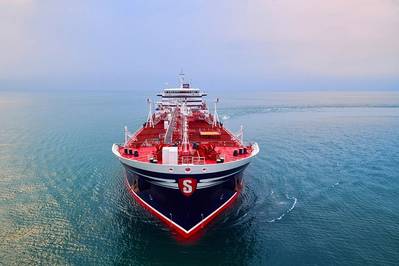Case Study: Onboard CCS Would Result in 10% Fuel Penalty
A project assessing the technical feasibility of onboard carbon capture and storage (CCS) has concluded that the technology has the potential to reduce a tanker’s CO2 emissions by as much as 20% per year, with a fuel consumption penalty of just under 10%.
The project, Realising Maritime Carbon Capture to Demonstrate the Ability to Lower Emissions (REMARCCABLE), was carried out by the Oil and Gas Climate Initiative (OGCI), the Global Centre for Maritime Decarbonisation (GCMD) and Stena Bulk together with ABS, Alfa Laval, Deltamarin, Lloyd's Register, Seatrium, and TNO.
It aimed to assess the viability of deploying carbon capture systems on vessels with minimal impact on operational constraints and analyzed the design and cost implications of retrofitting a carbon capture system on the medium-range tanker Stena Impero.
The tanker could maintain its CII rating of “C and better” for an additional nine years with this retrofit, allowing it to operate in compliance until the end of its vessel life, assuming a CII reduction factor of 2% from 2027 onwards.
The cost of building and installing the full system on the Stena Impero is estimated at US$13.6 million, with an abatement cost of avoided CO2 for the first-of-a-kind prototype evaluated at $769/ton CO2. The OpEx for the CCS retrofit was estimated at US$830K per year for additional support personnel, additional fuel consumption, maintenance and periodic amine replacement.
However, the consortium believes that further research and development will drive down costs, making OCCS increasingly viable for the shipping industry.
The study also looked at incorporating CCS on newbuild vessels and found that improvements to capture rate and fuel penalty may be achieved using more efficient engines, heat pumps and alternative solvents.
Erik Hånell, President and CEO of Stena Bulk, said: “This may be expensive for first movers, but the consortium believes that further research and development will drive down costs, making OCCS an increasingly viable solution for the shipping industry. The results will be instrumental for not only us, but for the whole sector, to evaluate the operational and commercial opportunities, as well as the challenges when capturing CO2 at sea.”
On the regulatory front, the industry awaits guidance from IMO’s Correspondence Group tasked with developing a framework for OCCS in MEPC 83. On the operational front, challenges include recurring additional costs due to fuel penalty, amine solvent replenishment, manpower maintenance and offloading services.
Offloading captured CO2 is in its nascency, with a lack of national and port policies for accounting captured CO2 and its final deposition. There is also a lack of infrastructure at ports to support offloading and storage. Therefore, collaboration and support from stakeholders across the value chain will be needed to develop offloading infrastructure and onshore storage, say the project partners. Logistical and policy support for permanent sequestration or utilization of the offloaded CO2 will also be necessary to encourage the adoption of CCS solutions.















